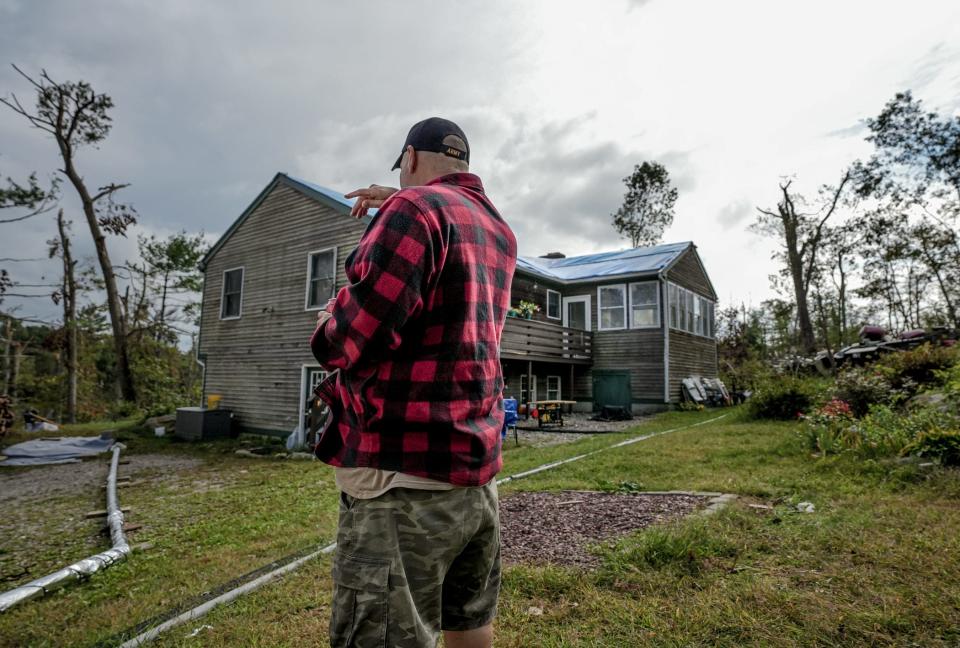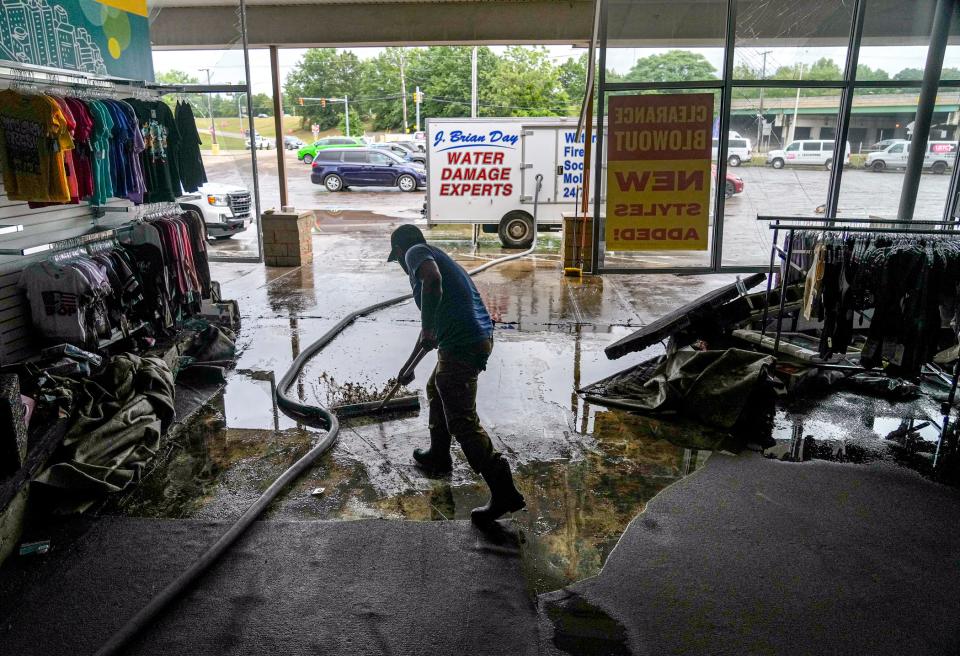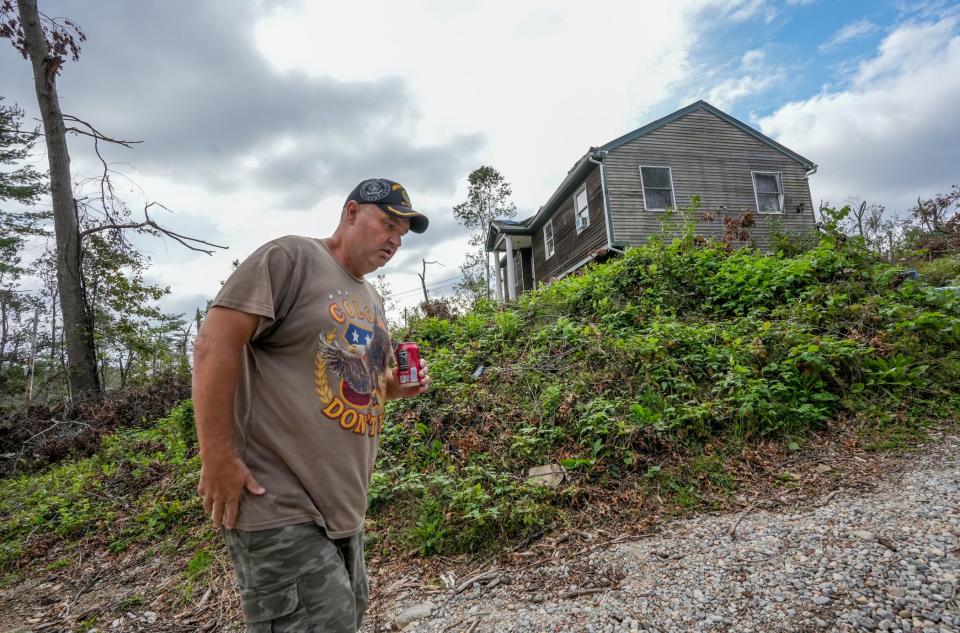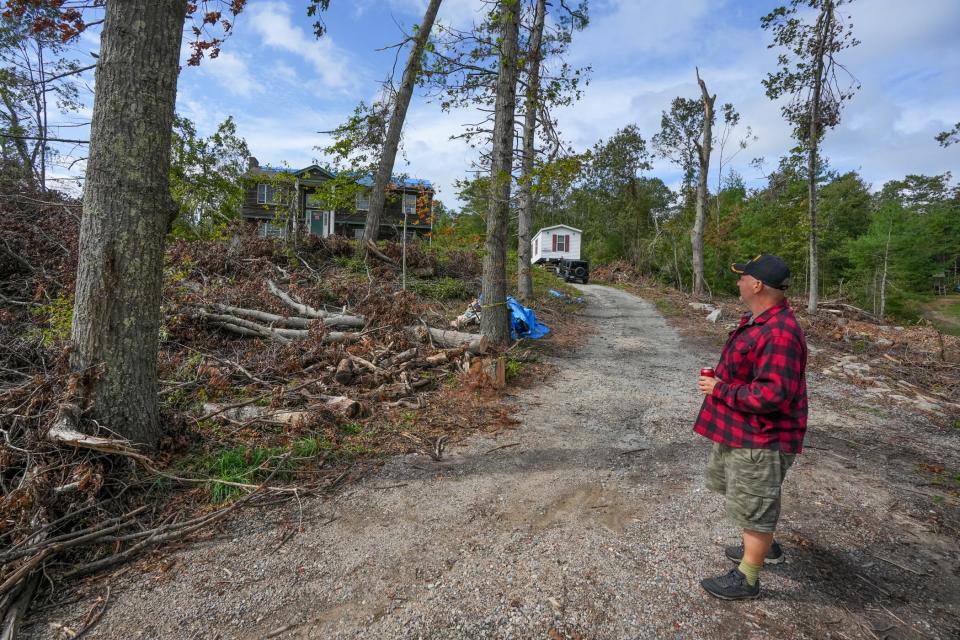Rhode Island's summer of extreme weather left its mark on the landscape, and people's minds
SCITUATE – More than a month after a tornado peeled off his roof shingles with fillet-knife precision, Richard O’Neill squints up at the inspector atop his house peeking under the blue tarp now protecting his home against the incessant rains.
With the plywood examination complete, the inspector tacks the tarp back into place and clangs down the ladder.
“If I have any crazy water coming in, I’m going to be calling – I don’t want any more damage,” O’Neill tells him, worried the tarp is now compromised in some way. “I want a roof on as fast as possible, but I don’t want any waterfalls in the meantime.”
“I understand,” the inspector says. “I’ll see if they can speed up that [insurance] approval.”
After the inspector leaves, O’Neill, a disabled veteran, says that trying to recover from the Aug. 18 tornado “has become a full-time occupation.” He had to move a mobile home onto the property for his family to stay in, and has been lining up contractors for interior repairs once the insurance company gives approval.
“My adrenaline is going like crazy, and I take medication for my heart. I'm trying to be a nice guy, but I get worked up. I keep getting more rainstorms.”

Rhode Island weather this summer was a lesson in extremes
The summer of 2023 and the weeks bookending the season brought an ominous level of calamitous weather, misery and climate-change awareness to many Rhode Islanders.
Coupled with around-the-clock news of unprecedented heat and weather events across the country and the world – August was the hottest month ever recorded on Earth – disaster-response professionals and even mental-health experts are seeing the impact.
“The anxiety about the environment has entered the therapeutic den,” says Robert Sheridan, a Providence psychotherapist. “Weather that seems really extreme is really anxiety-provoking. People are presenting to the office with more generalized anxiety.”
Perhaps for understandable reasons.
For weeks, intense, awe-inspiring deluges unleashed flash floods, like the Sept. 10 event that poured into a Cranston apartment building, leaving at least two dozen residents of Dean Estates with no place to go and in some cases with thousands of dollars in property losses.
The following day on Branch Avenue in Providence, first responders evacuated 25 motorists by rubber raft when torrential rains left 3 feet of squalid gray water pooling below the Route 146 overpass.

More than 8 inches of rain fell on Providence in July, the National Weather Service reports, making it the second-wettest month in at least 23 years. (About 10 inches fell on the state in 2009.)
And yet spring started dry. In April, large, wind-swept brush fires burned for days in Exeter and West Greenwich, serving as smoky harbingers of things to come.
In June, state health and environmental officials issued air-quality alerts as 400 forest fires in Canada cast a hazy, acrid pall over Rhode Island and more than a dozen other states.
An eerie orange fog enveloped New York City on June 7, blotting out the skyline. Health officials advised people to stay inside, flights were canceled and the city’s air quality dropped to the worst in the world. Yes, the world.
In recent weeks in Rhode Island, disaster response has been “a little bit like “Whac-a-mole,” says Susan Roberts, executive director of the American Red Cross Rhode Island chapter. “One disaster ends and another requires a response.”
“The climate has been changing, and it’s so noticeable now,” she says. “The storms are coming in a higher frequency; they are more intense. It’s been a very, very unique year, and it’s continuing. So, we are working to adapt and try to figure out ways to get out there and meet those needs as they escalate.”
Extreme weather, climate change affect mental health
In April, the American Psychological Association published an article on the long-term mental-health challenges caused by rising temperatures and extreme weather events.
It reported that “even some Americans who have not been directly affected by a climate disaster are experiencing climate anxiety.”
A 2020 APA survey found that 56% of U.S. adults said climate change is the most important issue facing the world today. And nearly half of young adults ages 18 to 34 said they felt stress over climate change in their daily lives.
Sheridan, the therapist, says he began seeing more patients expressing weather anxiety during the pandemic, folded in with their own personal issues, concerns of rising COVID deaths and the nation’s political polarization.
“They have their own anxiety they are dealing with, then the external environment is becoming increasingly ominous, so they are feeling wedged in,” Sheridan says. “New England is kind of sacrosanct in a way. Yes, we get hurricanes occasionally, but New England is the kind of place where this doesn’t happen, right? It feels dystopian in a way.”

Sheridan advises those feeling anxious about the changing climate to take command of their own environments: create a soothing atmosphere at home, don’t pollute “and do something that you feel is good for the environment.”
Weather extremes: Yes, downpours are getting heavier, and more frequent in RI. Here's the data.
A 'climate change data point'
Weather worries continued as autumn approached.
On Sept. 14, small tornados dropped out of downpours to skitter through Glocester and Lincoln, causing some tree damage but far less than the tornado that had skipped through Johnston, Scituate and North Providence on Aug. 18.
A day earlier, on Sept. 13, the Department of Environmental Management for the first time in its history closed state recreational parks (four locations in Glocester) because of the elevated risk of mosquitoes carrying Eastern Equine Encephalitis, what DEM Director Terry Gray described as “an imminent peril to public health.”
DEM spokesman Michael Healey noted the closings were a “climate-change data point” in an angst-ridden season.
At the time of the announcement, Rhode Island had 25 more days in 2023 considered favorable to mosquitoes (warm and humid) than it had in 1980, Healey said.
In the meantime, all eyes were watching the path of Hurricane Lee, scheduled to make a possible visit on Sept. 16. (Luckily, it veered farther east.)
'Unprecedented bat season': Rhode Island Health Dept. spreads safety message
Tornado cleanup continues in Scituate
In Scituate, the twisted trunks of trees that fell during the Aug. 18 tornado still lie along the sides of Bryon Randall Road, their wilting leaves turning the color of rust.
The sound of a chainsaw carries across the hollow where Richard O’Neill’s neighbor is still clearing his property.

O’Neill, his wife and two of their children raced into the basement just seconds before the roaring tornado blew out their windows, ripped off their roof and turned their lives upside down.
Ever since, says O’Neill, “it’s been a nightmare. But I’m not the only one.”
The forecast calls for rain Friday. And Saturday.
Contact Tom Mooney at: tmooney@providencejournal.com
This article originally appeared on The Providence Journal: RI weather: As storms get more extreme, residents must pick up pieces

